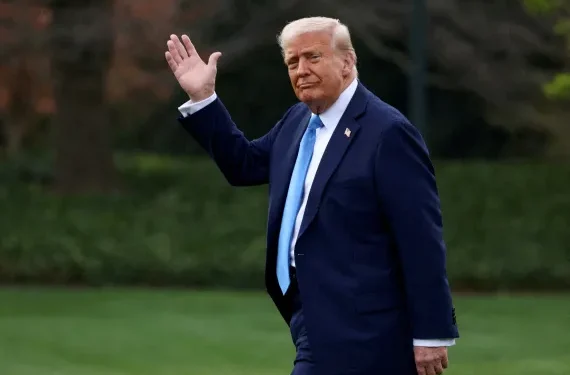US President Donald Trump has said he is “not joking” about the possibility of serving a third term. However, the US Constitution currently limits a president to conservative or non-conservative terms.
“There are methods which you could do it,” Trump said in a telephone interview on Sunday with NBC News from Mar-a-Lago, his private club.
The 22nd Amendment to the U.S. Constitution, ratified in 1951 after Franklin D. Roosevelt’s unprecedented four-term presidency, explicitly states: “No person shall be elected to the office of the President more than twice.” Despite this restriction, Trump has continued to hint at the possibility of remaining in office after his mandate expires in January 2029.
During a later conversation with reporters aboard Air Force One on his way from Florida to Washington, Trump elaborated further: “I have had more people ask me to have a third term, which in a way is a fourth term because the other election, the 2020 election, was totally rigged.” Trump lost that election to Democrat Joe Biden. However, he stopped short of outlining any specific plans, saying, “I don’t want to talk about a third term now.”
Opposition from Democratic officials
A group of Democratic election officials has raised concerns about a legislative proposal that would mandate proof of citizenship when registering to vote. The House Rules Committee will consider the proposal known as the Safeguard American Voter Eligibility Act (SAVE Act) on Monday.
Fifteen secretaries of state signed a letter sent to Congress on Friday, warning that such a measure could disenfranchise eligible voters and complicate election administration. “It is the job of election officials to verify the eligibility of citizens to cast a ballot, not the job of citizens to convince the government that they are eligible to exercise their right to vote,” the letter states.
While instances of noncitizen voting are rare, Republicans argue that even isolated cases undermine public confidence in elections. Last week, Donald Trump directed federal agencies to update voter registration forms to require proof of citizenship, a move expected to face legal challenges.
‘Liberation Day’ Tariffs and Economic Impact
Trump has declared Wednesday “Liberation Day,” a date when he plans to announce new tariffs aimed at reducing U.S. reliance on foreign goods.
While specific details remain unclear, economic analysts warn that increased tariffs could lead to higher prices for American consumers and potential disruptions in global trade. Trump, however, remains confident in the policy and has invited CEOs to the White House to discuss their investment plans in light of the tariffs.
“I’m certainly open to it, if we can do something,” Trump said, suggesting that the tariffs could be negotiable.
The upcoming tariffs could have significant economic consequences, influencing family budgets, the U.S. position in global financial markets, and international trade relations.
Public Opinion on Trump’s Policies
A recent poll conducted by the Associated Press-NORC Centre for Public Affairs Research found that while Trump’s stance on immigration remains a strength among his supporters, his trade policies are receiving more negative feedback.
Approximately half of U.S. adults approve of Trump’s immigration policies, but only about four in ten view his handling of the economy and trade negotiations positively. The survey suggests that while many Americans support his efforts to curb illegal immigration, concerns over potential economic fallout from tariffs could diminish his standing on economic issues.
Overall, Donald Trump’s job approval ratings remain underwater, with about four in ten Americans approving of his presidency and a majority disapproving.



